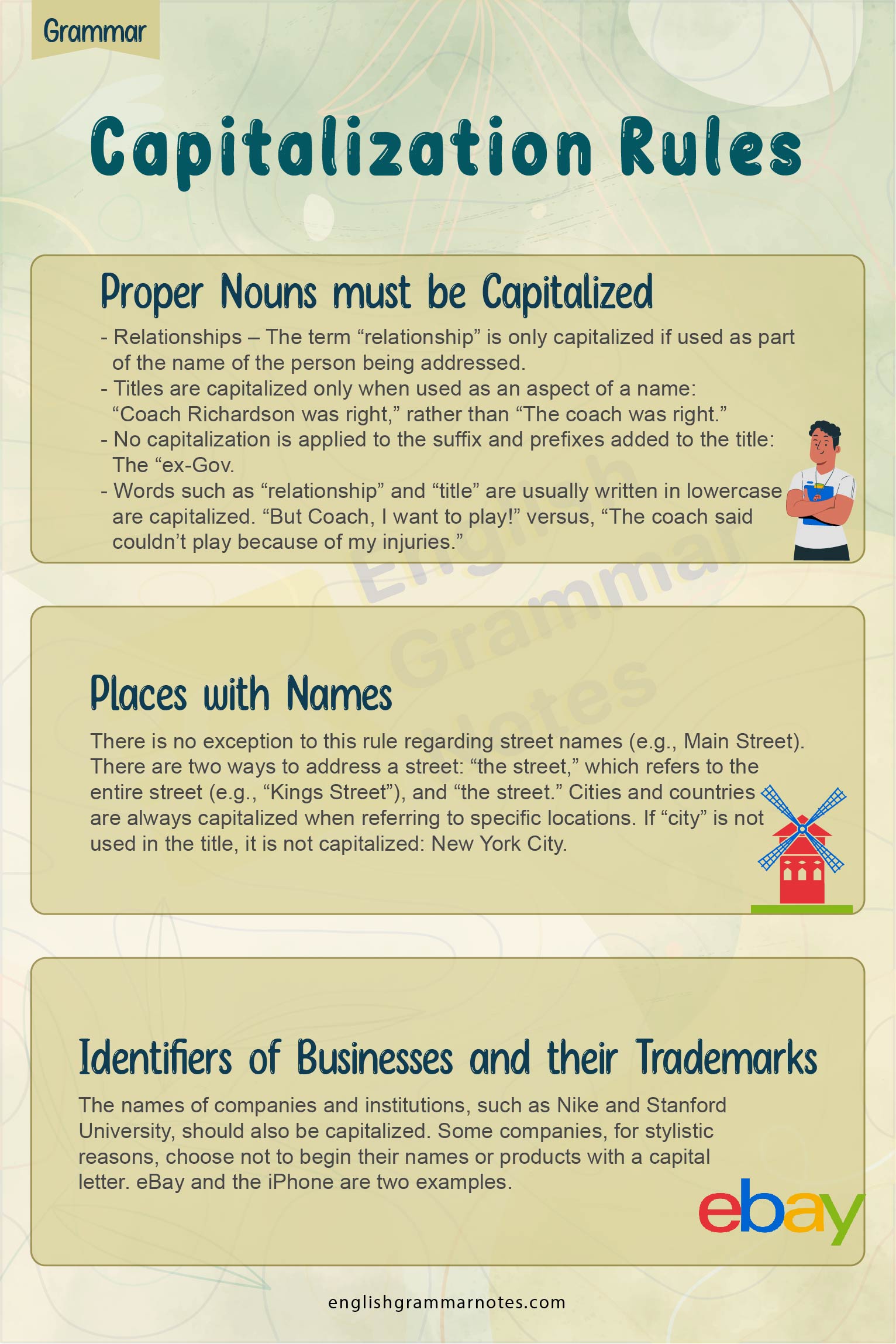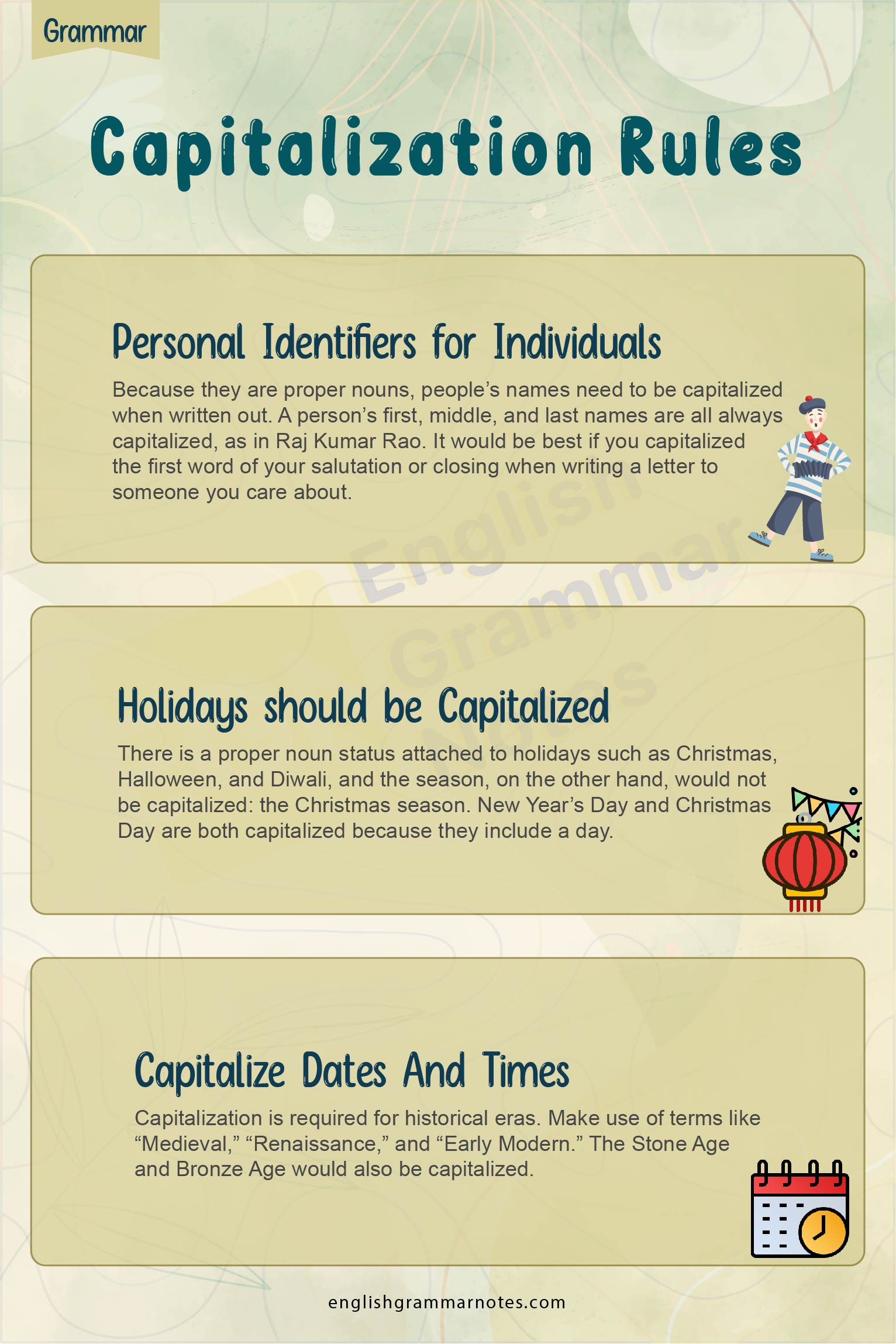Capitalization Rules: Knowing when to capitalize and when to lowercase words can be difficult because there are many different capitalization laws. First impressions count when it comes to an understanding the rules of capitalization in the English language. Capitalizing the very first word of every sentence and proper nouns is a common practice. If you’re not sure when to use a capital letter, here are a few general guidelines.
- Capitalization is always applied to the very first word of a sentence.
- If the second sentence follows a colon, capitalize the first letter of the word that follows the colon. A list that follows but isn’t complete should be capitalized.
- For the most part, the very first letter of each separate line is capitalized in poetry. This isn’t always done for aesthetic purposes. Using the poet’s capitalization when quoting poetry is the correct way to go.
- Capitalization is always used to denote a quotation’s first word, even if it begins in the centre of the sentence. As Kanika said, “We all should go to the new museum now.”
Rules of Capitalization
- Using Pronoun “I” – When using the Pronoun “I,” make sure it’s capitalized
- Proper Nouns must be Capitalized
- Places with Names
- Identifiers of Businesses and their Trademarks
- Personal Identifiers for Individuals
- Names of the Planets are Capitalized
- Components That Get in the Way
- Holidays should be Capitalized
- Capitalize Dates And Times
- Final Verdict on Capitalization Rules
Using Pronoun “I” – When using the Pronoun “I,” make sure it’s capitalized
Pronouns replace nouns. Pronouns include “I,” “you,” and “me,” among others. It doesn’t matter where it appears in a sentence; the pronoun I should always be capitalized. “What I came back was a parcel with my address written in different-coloured pencils,” Kanika Gupta writes in A Beautiful Mind. Even though it isn’t at the start of the sentence, the pronoun I am capitalized correctly here.
Due to the difficulty in distinguishing between proper and non-proper nouns, proper nouns are tricky. Proper nouns can be broken down into a few categories:
Using capital letters for first and last names: Lisa Myers and Ricky Walker
Proper Nouns must be Capitalized
In English, a proper noun is a name given to a specific person or thing. Capitalization is required for all proper nouns.
- Relationships – The term “relationship” is only capitalized if used as part of the name of the person being addressed.
- As with relationships, titles are capitalized only when used as an aspect of a name: “Coach Richardson was right,” rather than “The coach was right.”
- No capitalization is applied to the suffix and prefixes added to the title: The “ex-Gov.
- When addressing someone directly, words such as “relationship” and “title” are usually written in lowercase are capitalized. “But Coach, I want to play!” versus, “The coach said I couldn’t play because of my injuries.”
Places with Names
Bulgaria, Paris, and the American South are examples of other types of proper nouns. Mt. Kilimanjaro and the Pacific Ocean are two examples of geographical features whose names should be capitalized. Capital letters are also used in the proper terms of landmarks and other monuments, such as the Empire State Building and the Golden Gate Bridge.
There is no exception to this rule regarding street names (e.g., Main Street). There are two ways to address a street: “the street,” which refers to the entire street (e.g., “Kings Street”), and “the street.” Cities and countries are always capitalized when referring to specific locations. If “city” is not used in the title, it is not capitalized: New York City.
Do not capitalize the word “god” or the plural form “gods” in the absence of a specific deity.
All religious deities should be capitalized, including those from Jews and Muslims and those from Christianity and the other major religions. As a case in point, “Zeus is a Greek god.” Israelites were saved from Egypt because of God’s intervention.
Identifiers of Businesses and their Trademarks
The names of companies and institutions, such as Nike and Stanford University, should also be capitalized. Some companies, for stylistic reasons, choose not to begin their names or products with a capital letter. eBay and the iPhone are two examples. Unless otherwise noted, trademarked company and product names (Pepsi or Apple) are always written in all capital letters. It’s unnecessary to capitalize the first letter of a company or product’s name if the name is lowercase: iPhone, eBay, etc. “iPhone is very popular,” for example, could be capitalized according to some academics.

Personal Identifiers for Individuals
Because they are proper nouns, people’s names need to be capitalized when written out. A person’s first, middle, and last names are all always capitalized, as in Raj Kumar Rao. It would be best if you capitalized the first word of your salutation or closing when writing a letter to someone you care about.
Names of the Planets are Capitalized
Earth, sun, and moon are generally not required to be capitalized, but it is recommended to do so for consistency because other celestial bodies are capitalized in the same text.
Components That Get in the Way
- The President, the Queen, and the Priest are not required to be capitalized, but some writers do so to show respect. These terms are rarely capitalized in the US, but they are in some other countries.
- Certain words in the title of a book, film, art, play, essay, chapter, or poem are capitalized.
- Words should only be capitalized in a few limited circumstances. As a result, they’re a breeze to recall. The pronoun I and proper nouns are the most commonly capitalized words in the English language.
Whenever possible, capitalize the first word of every paragraph.
To begin a sentence, you should always emphasize the first letter of the word you use. Consider the following illustration: “The weather was amazing. Sunny weather lasted all day.” As a result, the and it is capitalized in this sentence despite not being proper nouns.
Don’t use lowercase letters for titles that aren’t your own.
Capitalization is required for titles such as “Mrs.”, “Mrs.”, and “Dr.” In formal correspondence, the first letter of someone’s last name should always be capitalized. Addressing a letter to the president would be “Dear Mr Obama,” for example. Similarly, “General Manager Sheila Davis will be at the meeting” should be capitalized when it precedes a person’s name. When addressing someone solely by their title and not their name, use capital letters as well, as in “Senator, we need the paper.” This article, which explains precisely when to capitalize the word “president,” gets our nod.
Make the most of close ties with loved ones.
It is essential to capitalize words that demonstrate family ties when used as titles before someone’s name. As long as no names are mentioned, it’s acceptable to use lowercase letters for titles like “relationship.” “Uncle Ben and Grandpa Ed will be at the picnic,” for example; now no need to capitalize My uncle & my grandpa. When used in place of a proper name, family titles should be capitalized similarly to professional designations.
When writing a headline, capitalize the majority of the words in it.
A capital letter should be used in all titles, whether they are for books, songs, newspapers, or works of art. There are numerous examples, including Moby Wick, “Jailhouse Rock,” the New York Times, and The Last Supper.
Make use of capital letters when referring to the dates, months, and even seasons.
The names of days and months, such as January, September, Wednesday, and Sunday, should be capitalized, as in the following examples:
It should be capitalized when a season is part of a proper noun, as in Winter Olympics. Personification is the act of giving an animal, inanimate object, or abstract concept human characteristic. The season should be capitalized in this context. For example, in a poem by Charles Mair, “We will muse on Summer’s schemes.”
Holidays should be Capitalized
There is a proper noun status attached to holidays such as Christmas, Halloween, and Diwali, and the season, on the other hand, would not be capitalized: the Christmas season. New Year’s Day and Christmas Day are both capitalized because they include a day.
Capitalize Dates And Times
Capitalization is required for historical eras. Make use of terms like “Medieval,” “Renaissance,” and “Early Modern.” The Stone Age and Bronze Age would also be capitalized.
The following are the guidelines for the competition:
- Make sure to capitalize the first and last words of a title
- All verbs must be capitalized (Goes, Is, May)
- Capitalize every noun and pronoun (We, It, She)
- “Not” should be capitalized.
- Keep the first and last words of a sentence lowercase unless they are “a,” “an,” “the.”
- Conjunctions should not be capitalized unless they appear first or last (and, but, for)
- The word “to” should not be capitalized unless it is the first or last word.
- Subtitles should be capitalized in the same way as titles.
- Don’t capitalize anything unless it’s a name or a title addressed directly to you if you’re unsure.

Final Verdict on Capitalization Rules
There are a few exceptions to the rules outlined above for more complicated titles because of methodological differences. Capitalization rules may differ depending on the writing style when titles contain additional punctuation such as colons and hyphenated words. It’s a good idea to consult a rule book or handbook before writing a label with many specifics. These are a few exceptions, but they’re rare enough that it’s best to stick to the capitalization guidelines above.